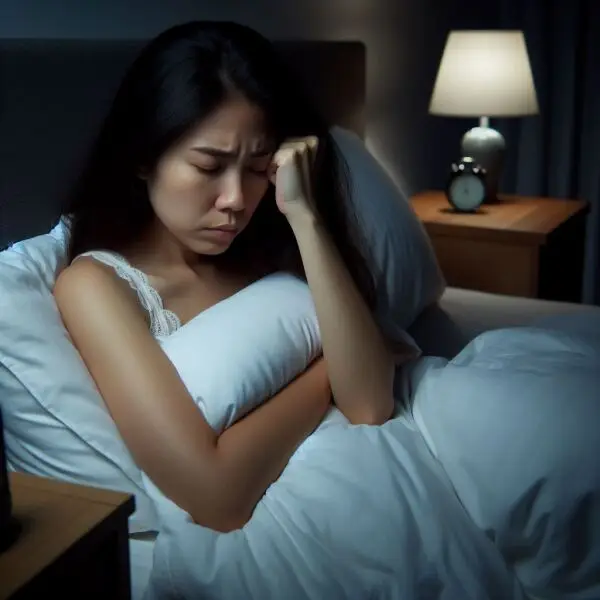I wake up at 3 am and I can't go back to sleep, what should I do?
Can't fall back asleep after waking up at 2, 3 or 4 am? Here's how to solve this distressing sleep problem....
Table of Contents
- Stress and anxiety
- Hormonal or Nutritional Imbalances
- Physical health issues
- Inadequate Sleep Environment
- Strategies to sleep well again
- Relaxation Techniques
- Constant routines
- Control the sleep environment
- Avoid electronic stimuli
- Practice Sleep Hygiene
- Cognitive Strategies
- Get out of bed
- When to seek professional help
Follow Patricia Alegsa on Pinterest!
The clock strikes 3 am and your eyes snap open.
Looking into the darkness of the room gives you a strange feeling of unease.
You wonder, once again, why you always wake up at this time and, above all, why it's so difficult for you to fall back asleep.
If this experience sounds familiar to you, you are not alone.
This phenomenon is more common than you think and has several possible causes and solutions.
Sleep consists of several 90-minute cycles, during which we go through different stages, from light sleep to deep sleep and REM (rapid eye movement) sleep.
Waking up at 3 am may coincide with the end of a sleep cycle, making us more susceptible to waking up and making it difficult to return to deep sleep.
Next, I will discuss the most common reasons for unexpectedly waking up at 2, 3, or 4 am and their solutions.
Stress and anxiety
One of my patients, Laura, a high-level professional, used to wake up at 3 am every day.
The culprit turned out to be accumulated work-related anxiety.
When we are constantly worried, our brain can become active in the early hours, triggering a state of alertness and difficulty falling back asleep.
Stress and anxiety are common culprits of insomnia. During moments of high emotional tension, the body can release stress hormones such as cortisol, which can disrupt sleep.
I suggest you read this article:
How to overcome anxiety: 10 practical tips
Hormonal or Nutritional Imbalances
During a consultation with Martín, a middle-aged man, we discovered that his nighttime awakening was due to hormonal changes, specifically in his cortisol levels.
In Martín's case, we made adjustments to his diet and lifestyle, and he found relief, managing to sleep through the night.
I address this issue in this article I wrote: The relationship between poor sleep and lactose intolerance
I address this issue in this article I wrote: The relationship between poor sleep and lactose intolerance
Physical health issues
Another patient, Elena, was facing a sleep apnea problem, which was waking her up several times during the night.
A medical evaluation and the use of a continuous positive airway pressure (CPAP) device allowed her to significantly improve her sleep quality.
Disorders like sleep apnea, restless leg syndrome, or hormonal problems can disrupt your sleep.
In these cases, the only possible solution is to consult a healthcare professional to rule out any underlying condition.
Inadequate Sleep Environment
Ana, a young mother, couldn't fall back asleep due to the noise and light seeping into her room.
Simple modifications, like installing blackout curtains and using a white noise machine, finally allowed her to rest through the night.
Consuming caffeine, alcohol, and other substances can interfere with sleep.
Additionally, using electronic devices before bed and lacking a consistent sleep routine can impact its quality.
An underutilized strategy for improving sleep, yet highly effective, is exposure to sunlight. It's very simple and very effective!
Learn more about this technique in this article:
An underutilized strategy for improving sleep, yet highly effective, is exposure to sunlight. It's very simple and very effective!
Learn more about this technique in this article:
Strategies to sleep well again
It is common for the reason that prevents you from sleeping well to not be unique, which complicates the diagnosis of the sleep problem. In fact, personally, I had to deal with sleep maintenance problems several years ago.
I tell you how I managed to solve my sleep problems in just 3 months in this other article that I suggest you schedule to read: I solved my sleep problem in 3 months: I tell you how
Anyway, I will leave you here general strategies that you should apply in your life to sleep better, regardless of what it might be
Relaxation Techniques
Laura, the patient I mentioned earlier, found meditation and deep breathing helpful.
Practicing the "4-7-8" technique (inhaling for 4 seconds, holding the breath for 7 seconds, and exhaling slowly for 8 seconds) allowed her to reduce anxiety and improve her sleep.
I suggest you keep reading this other article that might interest you: The more you worry, the less you live
I suggest you keep reading this other article that might interest you: The more you worry, the less you live
Constant routines
Maintaining a regular sleep routine is crucial.
Martín, one of my patients, after adjusting his diet and exercise, also benefited from going to bed and waking up at the same time every day, which helped to reprogram his internal clock.
Control the sleep environment
For Ana, it was essential to make sure her room was completely dark and quiet. Additionally, keeping the temperature cool makes a significant difference in her ability to rest.
Avoid electronic stimuli
Elena reduced the use of electronic devices before going to bed. The blue light emitted by phone and computer screens can interfere with the secretion of melatonin, the sleep hormone.
To read more about this topic, I suggest you read:Simple changes to reset your overstimulated nervous system
Practice Sleep Hygiene
Avoid heavy meals and alcoholic drinks before bedtime, practice regular exercise, and establish a relaxation routine before sleep have yielded positive results.
Cognitive Strategies
If your mind is active and you can't stop thinking, try the "thought pattern" technique.
Mentally repeat a calming word (such as "peace" or "tranquility") every time you find yourself caught in a spiral of thoughts.
I suggest you to read more strategies here:
I suggest you to read more strategies here:
Get out of bed
If you have been awake for more than 20 minutes, get up and engage in a quiet and relaxing activity until you feel sleepy again. Reading a book or listening to soft music can be helpful.
When to seek professional help
If you find yourself waking up at 3 am recurrently and the mentioned strategies don't seem to work, it could be helpful to seek guidance from a professional.
A psychologist specialized in sleep disorders can work with you to identify the underlying causes of your insomnia and develop a personalized treatment plan.
In some cases, cognitive-behavioral therapy for insomnia has proven to be very effective.
This form of therapy focuses on changing the thoughts and behaviors that perpetuate insomnia, helping you establish healthier sleep patterns.
In fact, it's the type of therapy I followed to resolve my sleep issues a few years ago, proving highly effective in improving sleep quality.
While there's no magic formula, with patience and persistence, it's possible to significantly improve your sleep quality.
My patients, with a combination of lifestyle adjustments and healthy sleep practices, have found the peace and rest they longed for, and you can too.

Subscribe to the free weekly horoscope
Aquarius Aries Cancer Capricorn Gemini Leo Libra Pisces Sagittarius Scorpio Taurus Virgo
-
 What boosts happiness in women, according to science
What boosts happiness in women, according to science
Discover the habit that boosts happiness in women, according to a Harvard scientist. It improves emotional well-being and promotes a healthier life. -
 What does it mean to dream of bombs?
What does it mean to dream of bombs?
Discover the meaning of dreaming about bombs and their relation to your emotions and decisions, don't miss this complete guide to interpret your dreams! -
 What does it mean to dream of chewing?
What does it mean to dream of chewing?
Discover the true meaning of dreaming of chewing in this fascinating article. Learn how this dream may reflect your emotions and current life situations. -
 What does it mean to dream about work?
What does it mean to dream about work?
Discover the true meaning behind your work dreams with our article: Job anxiety or a sign from the universe? Read more here! -
 What does it mean to dream of insects?
What does it mean to dream of insects?
Discover the meaning of your insect dreams and how they may reflect your unconscious fears, worries and emotions. Read our article now!
I am Patricia Alegsa
I have been writing horoscope and self-help articles professionally for over 20 years.
Subscribe to the free weekly horoscope
Receive weekly in your email the horoscope and our new articles on love, family, work, dreams and more news. We do NOT send spam.
Astral and numerological analysis
-
 Discover your future, secret personality traits and how to improve in love, business and life in general
Discover your future, secret personality traits and how to improve in love, business and life in general
-
 Online Dream Interpreter: with artificial intelligence
Do you want to know what a dream you had means? Discover the power of understanding your dreams with our advanced online dream interpreter using artificial intelligence that responds to you in seconds.
Online Dream Interpreter: with artificial intelligence
Do you want to know what a dream you had means? Discover the power of understanding your dreams with our advanced online dream interpreter using artificial intelligence that responds to you in seconds.
-
 What does it mean to dream of glasses?
What does it mean to dream of glasses?
Discover the true meaning behind your dreams with glasses in this article - stop feeling confused and learn how to interpret your dreams successfully! -
 What does it mean to dream of doors?
What does it mean to dream of doors?
Discover the mysterious world of dreams with this article on What does it mean to dream of doors? You'll explore the deeper meanings of your dreams and how they can affect your life. -
 9 Superfoods to Live Longer and Better, According to Experts!
9 Superfoods to Live Longer and Better, According to Experts!
9 foods that experts swear are the key to living longer and better. Take care of your heart, mind, and health with these daily ingredients! -
 What does it mean to dream of trains?
What does it mean to dream of trains?
Discover the meaning behind your train dreams and how they can influence your life - take advantage of this guide to make wiser decisions and achieve your goals! -
 Curiosity: The sleep disorder where sex occurs while we sleep
Curiosity: The sleep disorder where sex occurs while we sleep
Sexsomnia: a sleep disorder where sex occurs without being awake. It intrigues science and challenges intimate and emotional life. What a mess! -
 Live Fully: Four Keys to Active Health After 60
Live Fully: Four Keys to Active Health After 60
Discover the 4 keys to an active and healthy life after 60. Achieve physical, mental, and social balance with advice from longevity experts. -
 What does it mean to dream of meetings?
What does it mean to dream of meetings?
Discover the meaning of your dreams with encounters in this article. Understand how they can influence your life and what messages they are sending you. -
 What does it mean to dream of orange colors?
What does it mean to dream of orange colors?
Discover the meaning behind your dreams with orange colors. Discover how this color can influence your emotions and what hidden messages your dreams are sending you. -
 What does it mean to dream of handkerchiefs?
What does it mean to dream of handkerchiefs?
Discover the meaning behind your dreams with handkerchiefs. Discover the interpretation of this symbol and how it can affect your life in this informative article. -
 What does it mean to dream of beer?
What does it mean to dream of beer?
Discover the meaning behind your beer dreams: a desire to escape reality or a celebration to come? Find answers in our article. -
 The more you worry, the less you live
The more you worry, the less you live
Even if you don't like to think too much, there's nothing wrong with planning your schedule in advance. -
 What does it mean to dream of pencils?
What does it mean to dream of pencils?
Discover the hidden meaning behind your dreams with pencils - do they represent creativity or writing? Find out how to interpret your dreams with this article! -
 If you want to be truly happy, you must first become comfortable with sadness
If you want to be truly happy, you must first become comfortable with sadness
Life is regularly irregular; ultimately, if we felt happiness all the time, nothing would change.